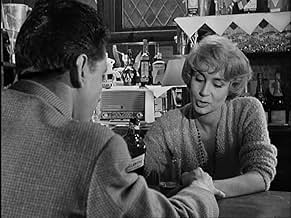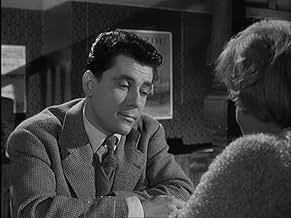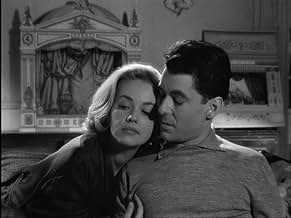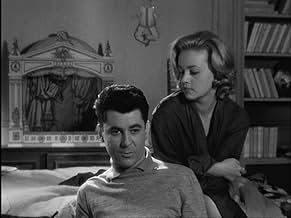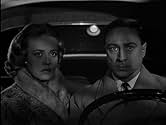AVALIAÇÃO DA IMDb
7,2/10
677
SUA AVALIAÇÃO
Adicionar um enredo no seu idiomaA wealthy industrialist discovers his wife is having an affair and decides to exact revenge by blackmailing her under an assumed identity.A wealthy industrialist discovers his wife is having an affair and decides to exact revenge by blackmailing her under an assumed identity.A wealthy industrialist discovers his wife is having an affair and decides to exact revenge by blackmailing her under an assumed identity.
- Direção
- Roteiristas
- Artistas
Avaliações em destaque
1958 was a busy year for Jeanne Moreau, as she debuted no less than four films. This "Le Dos Au Mur", by Édouard Molinaro, was the third, curiously placed between two fundamental works by Louis Malle, which would take Moreau, Malle and the nouvelle vague to stardom, "Ascenseur Por l'Échafaud" and "Les Amants" .
Out of curiosity, I mention that Moreau's first film of the year was also a Noir, "Échec Au Porteur" by Gilles Grangier.
In addition to Moreau's predestination for Noir, at least in 1958, attenuated only by "Les Amants", which despite being, essentially, a love film, still contains a story of adultery and above all the abandonment of her children, by the adulterous mother, that shocked spectators at the time, it is necessary to emphasize the profound differences between Molinaro's Noir and Malle's.
"Le Dos Au Mur" is a conventional Noir, albeit with a good script. The plot is tortuous, vengeful, cynical and everything seems to go as planned, until one detail ruins everything, as is characteristic of a good thriller. The film is good, the way the story is told is intelligent, as it accentuates the perversity of the characters, but it is still a late replica of American Noir. Of good Noir, naturally, far from a common B series.
However, if Moreau here is also an adulteress, she is much more victim than executioner, except in the final revenge, in a last act of desperation. The characters she embodies in Malle's works are much more complex. She is the force that manipulates men, that plans, that generates and feeds intrigue. She is a fascinating and seductive amoral creature, never a victim.
"Le Dos Au Mur" is an excellent Noir, but traditional. The cinematographic language is typical of the genre, with no evidence of the nouvelle vague, and the main character, who stands out most for his vindictive amorality and deviousness, is the deceived husband, played superiorly by Gérard Oury.
Molinaro's Noir and Malle's, made in the same year and with the same protagonist, belong to different times, the past and the future.
And the most curious thing is that they are both excellent. Even if one venerates Malle's originality and boldness, one cannot fail to recognize Molinaro's competence in filming a good script.
Out of curiosity, I mention that Moreau's first film of the year was also a Noir, "Échec Au Porteur" by Gilles Grangier.
In addition to Moreau's predestination for Noir, at least in 1958, attenuated only by "Les Amants", which despite being, essentially, a love film, still contains a story of adultery and above all the abandonment of her children, by the adulterous mother, that shocked spectators at the time, it is necessary to emphasize the profound differences between Molinaro's Noir and Malle's.
"Le Dos Au Mur" is a conventional Noir, albeit with a good script. The plot is tortuous, vengeful, cynical and everything seems to go as planned, until one detail ruins everything, as is characteristic of a good thriller. The film is good, the way the story is told is intelligent, as it accentuates the perversity of the characters, but it is still a late replica of American Noir. Of good Noir, naturally, far from a common B series.
However, if Moreau here is also an adulteress, she is much more victim than executioner, except in the final revenge, in a last act of desperation. The characters she embodies in Malle's works are much more complex. She is the force that manipulates men, that plans, that generates and feeds intrigue. She is a fascinating and seductive amoral creature, never a victim.
"Le Dos Au Mur" is an excellent Noir, but traditional. The cinematographic language is typical of the genre, with no evidence of the nouvelle vague, and the main character, who stands out most for his vindictive amorality and deviousness, is the deceived husband, played superiorly by Gérard Oury.
Molinaro's Noir and Malle's, made in the same year and with the same protagonist, belong to different times, the past and the future.
And the most curious thing is that they are both excellent. Even if one venerates Malle's originality and boldness, one cannot fail to recognize Molinaro's competence in filming a good script.
Released at the same time as "ascenseur pour l'échafaud" ,both featuring the same actress (Jeanne Moreau),but unlike Louis Malle's work,not labelled "nouvelle vague" "le dos au mur" has enough assets to catch the viewer's attention:outside Moreau,a screenplay adapted from a Frederic Dard 's Novel,with an action packed ending,and the desperate mood we find in every Dard-inspired film noir :such Moreau lines as "I could not live without him anymore,but I could not stand life without him "is the hero's only solace before his fate is sealed.
Gerard Oury who would direct such French blockbusters as "le corniaud" (1964) and "la grande vadrouille" (1966) is not much of an actor and his part should have been given to Robert Hossein,the par excellence Dard actor.Besides ,the screenplay which uses the long flashback one more time(one too many) laboriously progresses in the first half,with a much too slow pace.Worth a try all the same.
Gerard Oury who would direct such French blockbusters as "le corniaud" (1964) and "la grande vadrouille" (1966) is not much of an actor and his part should have been given to Robert Hossein,the par excellence Dard actor.Besides ,the screenplay which uses the long flashback one more time(one too many) laboriously progresses in the first half,with a much too slow pace.Worth a try all the same.
Not many characters are to be liked in this atmospheric, tightly-written crime drama, of which the first fifteen minutes are taken up by the disposal of a body. Not factory-owner Jacques (Gérard Oury) and his broody face, which dominates the film, not his wife's feckless loser-lover, the sports-car driving Yves. Not bar-owner and false friend Ghislane, not private dick Jerôme. And perhaps not entirely Gloria herself (Jeanne Moreau is excellent), the only person who knows her husband well-enough to work out his jealous machinations. There's an excellent twist as the plot circles back to that opening scene. Maybe this turns out to be a twisted, tainted love story after all.
This stylish film noir is filled with characters double-crossing each other and then exacting their revenge for the betrayal. Set in the post-war economic boom, the film explores how the qualities that make a driven entrepreneur successful in business can also lead to his downfall--though the path there is filled with twists and turns enough to keep the audience in suspense.
Jeanne Moreau is excellent as the wife caught between lover and husband. We're never quite sure what the character is thinking: is she really charmed to meet the minister or is it just good business? As often in French films of the period, foreign autos tell us a great deal about the characters: a Buick Special from the States for the husband and a flashy MG convertible from Britain for the lover.
The photography is excellent and the film's pace never flags as the plot zigs and zags its way to the conclusion.
Jeanne Moreau is excellent as the wife caught between lover and husband. We're never quite sure what the character is thinking: is she really charmed to meet the minister or is it just good business? As often in French films of the period, foreign autos tell us a great deal about the characters: a Buick Special from the States for the husband and a flashy MG convertible from Britain for the lover.
The photography is excellent and the film's pace never flags as the plot zigs and zags its way to the conclusion.
I see only 5 reviews here and that's a shame, this is too good to be forgotten like that.
Not a masterpiece, but a good- maybe very good- French film noir. Non linear structure (as many good movies of this genre), great acting performances (both Moreau and Oury were great, same as Maurier), charismatic actors, interesting characters, overall, this was enjoyable, almost exciting until its ending. I would say it was even somewhat original and creative, i mean, film noirs usually don't differ much with each other. But LE DOS AU MUR had a few tricks up its sleeve. A well written film noir is not that difficult to find but it's not that easy either.
If you like this genre, there is no chance you won't like it, at least.
Not a masterpiece, but a good- maybe very good- French film noir. Non linear structure (as many good movies of this genre), great acting performances (both Moreau and Oury were great, same as Maurier), charismatic actors, interesting characters, overall, this was enjoyable, almost exciting until its ending. I would say it was even somewhat original and creative, i mean, film noirs usually don't differ much with each other. But LE DOS AU MUR had a few tricks up its sleeve. A well written film noir is not that difficult to find but it's not that easy either.
If you like this genre, there is no chance you won't like it, at least.
Você sabia?
- CuriosidadesMichèle Morgan was first considered but she stepped out not willing to play alongside Gérard Oury, she lived with in secret at the time.
- ConexõesReferenced in Il mondo di notte (1960)
Principais escolhas
Faça login para avaliar e ver a lista de recomendações personalizadas
- How long is Back to the Wall?Fornecido pela Alexa
Detalhes
Bilheteria
- Orçamento
- FRF 80.000.000 (estimativa)
- Tempo de duração1 hora 33 minutos
- Cor
- Mixagem de som
- Proporção
- 1.37 : 1
Contribua para esta página
Sugerir uma alteração ou adicionar conteúdo ausente

Principal brecha
By what name was Perversidade Satânica (1958) officially released in India in English?
Responda


